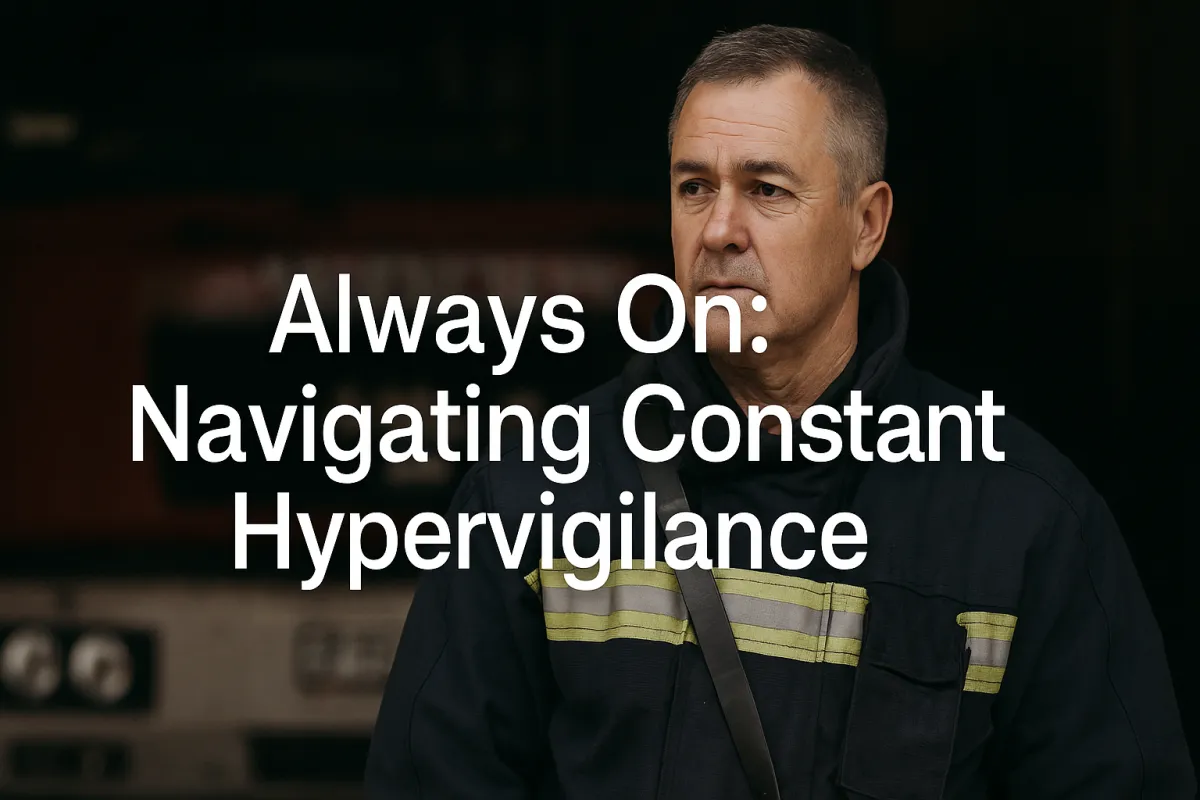
Always On: Navigating Constant Hypervigilance
Always On, Always Alone: The Hidden Cost of Constant Readiness
By Krista Fee | RISEUP: Voices From the Frontlines | Responder Wellness Series
You don’t get to shut it off—not really.
Even when the uniform is hung, the rig is parked, and the world calls it a “day off,” your body stays primed. Heart rate elevated. Shoulders tense. Mind scanning. You’re still tracking exits in every room. Still anticipating worst-case scenarios. Still ready to protect everyone but yourself.
Welcome to constant readiness—the baseline state of hypervigilance that most first responders and high-alert professionals live in without even realizing it’s slowly destroying them.
The Reality Behind the Hero Narrative
You’re the one who shows up when no one else will. You hold the chaos so others can function. You’ve trained your brain to assess risk faster than most people can check their phone.
But this level of vigilance doesn’t come without a cost.
Over time, the nervous system—designed for short bursts of stress—begins to deteriorate under cumulative trauma and chronic hyperarousal.
The result? You may look composed, competent, and high-functioning on the outside… but on the inside, your system is frayed.
Let’s Talk About Your Brain
Neuroscience gives us the map.
When the amygdala (threat detector) is constantly activated, the prefrontal cortex (logic, empathy, executive function) starts to dim. Cortisol remains high. Sleep cycles get trashed. Your body doesn’t get the signal that the danger has passed—because in your line of work, it hasn’t.
The long-term consequences include:
Sleep disorders
Emotional dysregulation
Heart and gut issues
Shortened attention span
Increased risk of substance use
Relationship erosion
And yet... most responders never get taught this in academy. You’re trained to survive the moment—not to sustain the mission.
“Why Am I Like This at Home?”
If you’ve ever asked yourself:
Why do I snap at my partner over nothing?
Why can’t I sleep even when I’m dead tired?
Why do I feel numb when I should feel joy?
…there’s nothing wrong with you.
You’re not broken. You’re conditioned.
Your nervous system isn’t trying to ruin your life. It’s trying to keep you alive.
The problem? It doesn’t know when the shift ended. Especially if the shift never really ends.
The Collateral Damage: Relationships + Identity
Constant readiness often leads to:
Irritability or withdrawal at home
Emotional shutdown in conflict
Feeling isolated even in a crowd
Guilt over not being "present" with loved ones
Loss of identity outside the badge, uniform, or title
Your family may not understand it. Your partner may take it personally. And you may silently wonder if you’re beyond repair.
You’re not.
But you do need tools that meet your reality, not just surface-level self-care.
Tools for Tactical Recovery
These are not fluffy wellness ideas. They’re field-ready nervous system resets designed to work with your body—not against it.
1. Controlled Discharge
Heavy lifting. Sledgehammer + tire. Tension release is not optional—it’s operational.
2. Grit-Based Breathing
Use box breathing, 4x4 breath, or tactical inhale/hold/exhale to recalibrate after intense calls or before walking into your house.
3. Decompression Zones
Create literal physical transition spaces—your truck, a specific bench, the gym—where your system learns to downshift.
4. Peer Debriefing
Talk it out with people who understand the culture. Choose safe spaces that offer shared language and humor.
5. Name the Shift
Say it out loud when you’re switching roles. “I’m home now. I’m not on call. This is my recovery space.” Your nervous system listens when you narrate safety.
You Deserve to Come Home to Yourself
Your hypervigilance protected people. But it’s not your identity. It’s not your personality. It’s a response—and responses can change.
There is a version of you who knows how to rest without guilt. Who can connect without scanning. Who can exhale fully for the first time in years.
Let’s get you there. One breath, one tool, one repatterning at a time.
🔗 JOIN THE RISEUP RESPONDERS COMMUNITY
This isn't therapy. It's tactical nervous system training, peer mentorship, and trauma-informed support built for your lifestyle.
🧭 Register now →CONNECT
🤝 SPONSOR THE WORK
Help bring RISEUP™ programs to departments and responders across the country. Align your brand with trauma-informed public safety and real-world wellness.
📩 Request a sponsorship packet → BATTLE2BE
You were trained to survive. Now it’s time to learn how to recover.
🎧 Listen to the full podcast episode now → RISEUP Voices From the Frontlines
🏷 #RISEUPResponder #FirstResponderWellness #Hypervigilance #TraumaRecovery #ConstantReadiness #CumulativeTrauma
